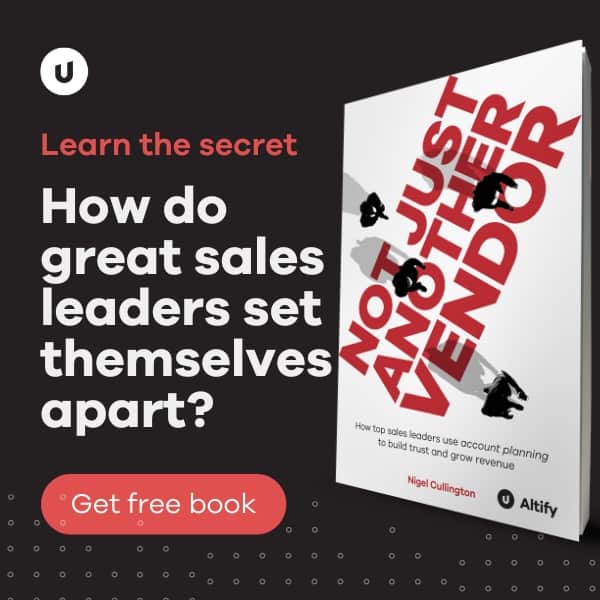I have observed something very interesting lately, that you may find enlightening. I think I always knew it – but only recently did I start to formalize it. It is a critical area of focus for successful sales people, and it might not be the one you expect.
Over the past year, I have been privileged to spend a lot of time speaking at sales meetings and other customer events. During these sessions I always try to spend as much time as I can chatting with the sales people in the room. These people are the reason why I am there in the first place. Nearly every person I meet teaches me something about the realities of selling in their particular industry. As I move from company to company and industry to industry there are may differences in how buyers buy and consequently how good sellers sell. However, as you would expect there are also many similarities.
As I observed some of those similarities I started asking the sales professionals I met how they thought about their job. What was the one thing they focused on everyday? I gave them four options:
- Building their (personal) business
- Making their customer successful
- Applying a sales methodology
- Achieving their quota
Then I correlated their answers with their actual sales performance in the preceding year. I was trying to establish which mindset was most closely related to top performance, and whether one could indeed make a meaningful correlation.
Tom, Karen, Steve and Jim are good examples of each mindset.
- Tom is an example of a rep who looks at his sales job as his own business. Every year he builds out his plan, sets out some goals and objectives, looks to identify obstacles and what resources he might need to succeed. He updates his plan every quarter adjusting his strategy and tactics as he goes. Part of his week is business development, he spends time working on the deals in his pipeline, and he leverages the other functions in his company to support his activities. Tom is a reliable contributor to his company and is viewed as part of the team.
- When a customer deployment clashed with President’s Club, Karen chose not to go to Club. She wanted to be with her customer. “It was the least I could do – they had trusted me with their business.” Karen is completely focused on her customer’s success – sometimes to the frustration of her sales manager. “Karen will never push the customer to sign a deal at the end of a quarter if she feels the customer is not ready to do so. But, her customers love her, and she is our number one or two sales person every year.” Karen, like Tom, also manages her business in a very organized manner, but the customer is the absolute center of her universe. She makes sure that she has enough in her pipeline that she never has to pressure a customer for a deal – and she always takes the long-term view. “If I do right by them, they will do right by me.”
- Steve is a methodology zealot – a true TAS fanatic. He qualifies rigorously and is very disciplined in his pursuit of each sales opportunity. He will never be found chasing deals where he does not have a good Solution Fit for his customer and works hard to make sure that he has appropriate access to all of the influencers. He defines a Competitive Strategy for every encounter and, because he works hard on researching his customers’ business he brings valuable Insight to every conversation. When Steve pursues an opportunity his Win Rate is greater than 50%. He joins Tom and Karen at Club most every year.
- Jim knows his goal. He knows his compensation plan, and he knows his quota, and that is where he is focused. He is a very capable sales person. “When I get enough opportunities from marketing, I can make my number. Without that, what am I supposed to do?” Ken tries to ensure that is working on enough deals to make his quota every quarter, but will do little to find deals himself. He actively engages with the person in the buyer’s organization who ‘owns the project’ but does not sell wide or invest enough time in understanding the customer’s business. He will frequently be found debating his targets and goals – though often will not make the Club trip.
In truth, Tom and Karen are very similar. These are not sales people – they are in fact sales entrepreneurs. They too exhibit ‘role model’ behavior when it comes to disciplined application of sales methodology. In nearly every case, Tom and Karen are the ‘A Players’ in their companies’ sales teams and need little external stimulus to succeed.
Steve is a great example of a "B Player" who has benefited from the investment his company has made in sales methodology. There are many ‘Steves’ out there – in fact they are the majority of most sales organizations. Those who apply methodology achieve steady if unremarkable success. Those who don’t, don’t. This is an important coterie of contributors who deserve attention.
Unless something changes, Jim is past his sell-by date. His innate selling skills are being applied in the wrong way. He can close deals – but only where a Frontal Strategy works. He will sometimes convince himself that he is adopting a Flanking Strategy – because that makes him feel like he is being strategic. In fact he usually does not follow through on the Flanking Strategy as it requires a change of relationship strategy as well as a repositioned solution. A singular focus on quota attainment without the requisite ‘business-person focus’ is no longer close to enough to survive (if it ever was.) The sad thing is – Jim is really very capable, but without a change in his behavior he will at best be a ‘C Player". If Jim works for you, then it is time to help him, He needs structure, discipline, coaching, and a guiding hand to help him build his confidence.
All of this points to a need to understand that there are many ways to succeed. A focus on Business, Customer or Methodology works. A singular focus on Quota without the other attendant behaviors doesn’t. You might want to ask my ‘focus question’ of your sales team and act accordingly. The results could be very rewarding.



